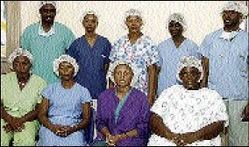Hospital staff makes service its priority
Published: Thursday | March 19, 2009

Operating theatre staff at the Black River General Hospital in St Elizabeth have made service the centre of their focus. From left (back row) are Dr Sheriff Imoru, a general surgeon; Karlene Smith and Damodharasamy Savithiri, registered nurses; and Dr Terrence Morris. From left (front row) are Angella Bennett, ward assistant; Sister Ingrid Stephens, head of the theatre nursing staff; Nickesha Shaw-Myles, registered nurse; and Seta Clarke, an orderly. - Photo by Noel Thompson
WESTERN BUREAU:
THE STAFF at the Black River General Hospital in St Eliza-beth deserves thumbs up for a job well done.
In a sector which often receives searing tongue lashes from members of the public, the converse has happened there.
While some of the hospital's counterparts are being harshly criticised, at least one member of the public is openly congratulating the staff for maintaining well-organised clinics and for giving special attention to patients.
Professionalism
Medical representative Zonite Williams recently brought the matter to The Gleaner's attention following a visit to the Black River General Hospital where she was quite impressed with the level of health care and professionalism demon-strated by the operating-theatre staff.
On Tuesday, The Gleaner's Western Bureau journeyed to the hospital to take a first-hand look at the kind of care and preparation exercised prior to, during and after surgery.
Sister Ingrid Stephens is head of the nursing staff of the operating theatre.
She says usually, patients are referred to the surgical department by the accident and emergency department, a private practitioner or by a doctor working on the ward.
"On arrival at the surgical clinic, patients are seen by a nurse who undertakes an assessment to ensure that their state of health is up to par. A surgeon then determines if the patient is to be seen immediately or when the most appropriate time would be," Sister Stephens explained.
The anaesthetist then does an assessment and upon consultation with the theatre staff, a date is set for surgery.
Most patients opting for surgery are usually overcome by fear, but the journey is between them and God.
Thus, the theatre staff not only prepares patients for surgery physically, but mentally as well.
"A mental assessment is done to determine the patient's level of expectation and anxiety. The patient is educated about the surgery procedures during a one-on-one session with staff prior to the operation. This helps the patient to be more mentally prepared and have little or no fear," said Stephens.
Nurse Desorie Brown-Nish concurred.
"Patients are always fearful and have sleepless nights ahead of their surgery. It is, therefore, incumbent upon us as theatre staff to interact with the patient to alleviate their fears and this usually works. Patients are more confident and relaxed on the day."
Something unique
"This is something unique to Black River Hospital. I have worked at several other hospitals, operating theatres and surgical clinics and it was different," said Dr Sheriff Imoru, a general surgeon.
"It is imperative to build patient-staff relationship throughout the procedure. It is a staff decision we make and it's more like a family setting," said Dr Imoru.
The general surgeon said there was room for improvement in the areas of manpower and resources, as there had been about a 25 per cent increase in patients.
While that is so, Dr Imoru said his team still tried to do its best.
Meanwhile, Chief Executive Officer Diana Brown emphasised that the hospital staff strove to make quality the hallmark of its service.
noel.thompson@gleanerjm.com










